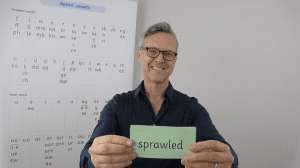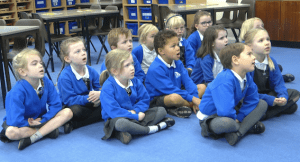

Ruth’s blogs

Teaching Comprehension Strategies Alert
‘Comprehension strategies’, like making inferences, using graphic organisers, or predicting, don’t reliably boost progress in young readers; instead, building a wide reading habit and strong vocabulary is the only dependable path to true comprehension.

Some joined up thinking about dyslexic children and joined up writing
Ruth Miskin challenges the assumption that cursive writing benefits struggling readers, highlighting how joining letters early can be harder for children (especially boys), makes writing illegible, steals time from teaching reading, and overwhelms their cognitive capacity; instead, she urges teaching clear print first, with daily practice, before introducing joins once writing is automatic.

Teaching Handwriting in Reception
In Reception, every child benefits from daily 10–15-minute handwriting practice using sharp pencils, proper posture, “mind-picture” checklists, and “Demonstrate-Practise-Review”, all while avoiding joins, floor writing, entry strokes, or board copying to build confident, clear letter formation.

Handwriting Alert
Ruth Miskin highlights how entry (and many exit) strokes, disrupt phonics mnemonics, make letters harder to write, cloud handwriting clarity, and even complicate later joined writing; she urges that clear, stroke-free letter formation is essential for confident early writers.

The Right Brain for Reading
Even if two children are the same age, they’re far from equals in reading. Some, like “Daisy,” lag behind. But with joyful, well-practised phonics lessons, mnemonics, daily reading of matching decodable books, and fluency built through repeated reading, we can fire up the brain’s neural connections and turn any child into a reader who loves reading.

Whoopsy Daisy
A Year 2 girl named Daisy seemed to hate reading, juggling mismatched banded books and refusing to read at home, until we found her “Goldilocks spot” with a decodable story she could actually read, sparking joy, confidence, and nightly requests for more.

Why book bands block children’s reading progress
Ruth Miskin explains how book bands confuse parent and teacher judgement, mask true reading ability, and steer children toward guessing rather than decoding, arguing that randomly grouped schemes undermine phonics progress, she urges schools to ditch bands for decodable texts aligned to teaching.

Guest Blog: Should we teach phonemic awareness?
Jennifer Chew highlights that although phonemes zip by at 10–15 per second in everyday speech, true learning comes when we pair phonemic awareness practice with letters, helping children not just hear, but connect, blend, and manipulate sounds in print.

Cursive Handwriting in Reception – or not?
Ruth Miskin argues that formal cursive in Reception is a problem, it distracts from reading and spelling, so instead, children should first master clear print, posture, mnemonics, and simple joins only when writing becomes automatic.
